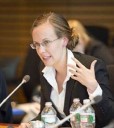Monday, Apr 5, 2021 | 05:00 AM - 05:45 AM
Location: Meeting Halls A&B, HQ1-3-430A&B

Inequality around the world has been growing in recent years, and the pandemic has only made matters worse. As a result, more and more of the IMF’s policy advice and capacity development collaborations have focused on the issues of social spending and social protection. This session will showcase how the IMF, the World Bank Group, and member countries team up to implement more effective social protection programs, strengthen social safety nets, and protect the most vulnerable from economic shocks and the potential adverse effects of reforms.
 |
Roger Nord Deputy Director Institute for Capacity Development, IMF |
Roger Nord is a national of the Netherlands. Currently Deputy Director of the IMF’s Institute for Capacity Development, he oversees the IMF’s global partnerships. Previously, he was Deputy Director of the IMF’s African Department, responsible for country operations in East Africa and francophone West Africa and oversight over the IMF’s network of resident representatives in sub-Saharan Africa. He also led the work on public finance issues in Africa and was responsible for the IMF’s relations with China regarding Africa. Among his publications, he co-authored A Rebalancing Act for China and Africa: The Effects of China’s Rebalancing on Sub-Saharan Africa’s Trade and Growth (2017) with Wenjie Chen, and was the lead author of Tanzania – The Story of an African Transition (2009). Before joining the African Department, he was advisor to IMF Managing Director Horst Köhler and the IMF’s regional representative in Central Europe. He is a graduate of the University of St. Gallen, Switzerland, and of the University of Chicago.
 |
Antoinette Sayeh Deputy Managing Director, IMF |
Antoinette Monsio Sayeh has been a Distinguished Visiting Fellow at the Center for Global Development (CGD) since November 2016 and was Co-Chair for the recently concluded 19th Replenishment of the International Development Association (IDA19), the World Bank’s Fund for the poorest. She previously oversaw and significantly enhanced the International Monetary Fund’s engagement with its sub-Saharan African members as Director of the African Department between July 2008 and August 2016.
As Minister of Finance in post-conflict Liberia (January 2006 through June 2008), she led the country through the clearance of its long-standing multilateral debt arrears, the HIPC Decision Point, the Paris Club, and its first Poverty Reduction Strategy, significantly strengthening its public finances and championing public financial management reform. Before joining President Ellen Johnson Sirleaf’s Cabinet, Ms. Sayeh worked for the World Bank for 17 years, including as Country Director for Benin, Niger, and Togo; Senior Country Economist for Pakistan and Afghanistan, as well as an Advisor in the Bank’s Operations Policy Vice Presidency and as Assistant to its principal Managing Director. Before joining the Bank, Ms. Sayeh worked in economic advisory positions in Liberia’s Ministries of Finance and Planning.
Ms. Sayeh graduated with a bachelor’s degree with honors in economics from Swarthmore College and a PhD in International Economic Relations from the Fletcher School at Tufts University. While at CGD, Ms. Sayeh has also served on the Board of Managers of Swarthmore College; Board of Directors of the Ellen Johnson Sirleaf Presidential Center for Women and Development; and Board of Directors of Emerging Public Leaders.
 |
Fernanda Brollo Senior Economist, IMF |
Fernanda Brollo is current a Senior Economist in the Fiscal Affairs Department of the International Monetary Fund. Since she joined the Fund in 2018, she has been engaging in several areas related to expenditure policy topics, including energy subsidy reforms, public sector wage bill, social protection, and costing the Sustainable Development Goals (SDGs). She provides capacity development to country members, supports area departments, and conducts analytical work in all these topics. She has published in top academic journals, such as American Economic Review, Journal of European Economic Association, Economic Journal, Journal of Development Economics and American Political Science Review. She has previously worked at the University of Warwick and the University of Alicante and taught in different graduate programs. She obtained Her Ph.D. in Economics from Bocconi University in 2010.
 |
Brooks Evans Economist, IMF |
Brooks Evans is an economist at the International Monetary Fund. He focuses on both macro- and microeconomic analysis and policy advice in advanced and developing countries. He works on assessing the distributional effects of fiscal policy—both taxes and expenditure. His areas of focus include social assistance, labor market programs, pensions, subsidies, and the public sector wage bill. He led the development of the IMF’s Social Protection and Labor Assessment Tool, co-created and delivered the first IMF course on "IMF Engagement on Social Safety Nets", and co-authored the book Measuring the Effectiveness of Social Protection: Concepts and Applications . He previously worked at the World Bank, where he trained officials and experts worldwide on social protection, labor, and poverty analysis. He conducts research on these topics as well, which have been highlighted in publications such as the IMF’s Fiscal Monitor and the World Bank’s World Development Report.
 |
Tanja Goodwin Senior Country Economist, WBG |
Tanja Goodwin is currently Senior Country Economist in the regional World Bank Office in Lima, Peru, covering Bolivia, Chile, Ecuador and Peru. In her role as Program Leader for the Global Practice for Equitable Growth, Finance and Institutions, she covers topics from Macro- and Fiscal Management, Trade, Investment, Governance, Poverty and Equity, to Finance, Innovation and Competitiveness.
Tanja joined the World Bank in 2011 and, since then, has held various positions in global and regional units in the finance and private sector development space. Tanja is specialized in micro-economic structural reforms, pro-competition sectoral regulation and competition policy. She has extensive experience in lending operations and analytics in Latin America, Northern Africa, Eastern Europa, East Asia and the Pacific. Most recently, she led programs in Argentina, Mexico, Peru and Russia.
Before joining the World Bank, Tanja worked at private and public research institutes in Germany and in Latin America. Tanja holds a master’s degree in economics from New York University and a BSc in International Economics from Tuebingen University, Germany. During her time at the Bank, Tanja has also taught in different graduate programs, including at the Pontificia Universidad Catolica del Peru.
 |
Sania Nishtar Special Assistant on Poverty Alleviation and Social Safety to the Prime Minister of Pakistan |
Dr. Sania Nishtar is the current Special Assistant on Poverty Alleviation and Social Safety to the Prime Minister of Pakistan, with the status of Federal Minister and the Chairperson of the Benazir Income Support Program. She is a Pakistani cardiologist, author and activist. Previously she served in the interim federal cabinet in 2013 overseeing public health, education and science. She currently chairs or co-chairs several international initiatives (WHO’s High-Level Commission on Non-communicable diseases, World Economic Forum’s Global Agenda Council, the U.S National Academy of Sciences Global Study on the Quality of Healthcare in low and middle-income countries, and the U.N. International Institute for Global Health’s International Advisory Board). Nishtar was a leading candidate for the director-general of the WHO. If elected she would have been the first leader of WHO to come from a developing country. Her outstanding management and leadership has been critical to the ongoing strengthening of Pakistan’s social safety net, as envisaged under the IMF EFF, and for the rapid deployment of emergency assistance to vulnerable people during the COVID-19 shock. She has been elected Senator at the March 3 elections, which would secure her stay at her position during this government’s tenure.